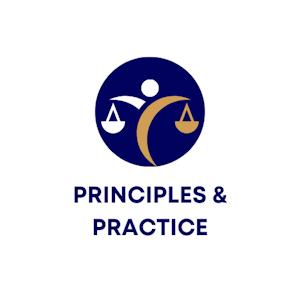Principles Alone Won't Drive Success: How to Ensure Holistic Evaluations Make a Real Impact
While holistic evaluations offer a comprehensive view, they are only as effective a s their implementation. Simply adopting these principles without “adopting the spirit” consistent with the principles, can render them meaningless. This is where the concept of “doing the right thing” comes into play. It’s not enough to espouse ideals or incorporate new evaluation criteria; these principles must be actively reflected in daily practices to achieve true success.
s their implementation. Simply adopting these principles without “adopting the spirit” consistent with the principles, can render them meaningless. This is where the concept of “doing the right thing” comes into play. It’s not enough to espouse ideals or incorporate new evaluation criteria; these principles must be actively reflected in daily practices to achieve true success.
Holistic Performance Evaluations: Balancing Principles with Practical Success
In the ever-evolving realm of human resources, performance evaluations are critical tools for fostering employee growth and organizational success. While traditional evaluations often focus on metrics and productivity, a modern approach—holistic performance evaluations—offers a broader perspective. This method not only assesses job performance but also delves into skills, well-being, cultural fit, and career aspirations. However, it’s important to recognize that merely adopting a holistic approach does not guarantee success. The true measure of effectiveness lies in how well these principles are integrated into daily practices.
Understanding Holistic Performance Evaluations
Holistic performance evaluations aim to provide a well-rounded view of an employee’s contributions and potential by evaluating various dimensions:
- Job Performance: Assessing achievements and productivity/efficiency remains crucial but should be viewed within the larger organizational context.
- Skills and Competencies: Beyond current job performance, evaluating technical and soft skills helps identify areas for growth and development.
- Employee Well-being: Acknowledging work-life balance, job satisfaction, and mental health is essential, as these factors significantly impact performance.
- Cultural Fit and Values: Assessing how well an employee aligns with organizational values and culture promotes a harmonious work environment.
- Development and Career Aspirations: Considering an employee’s career goals allows for tailored development plans that align with both personal aspirations and organizational needs.
The Disconnect Between Principles and Practicality
While holistic evaluations offer a comprehensive view, they are only as effective as their implementation. Simply adopting these principles without practical application can render them meaningless. This is where the concept of “doing the right thing” comes into play. It’s not enough to espouse ideals or incorporate new evaluation criteria; these principles must be actively reflected in daily practices to achieve true success.
Principles Versus Practical Success
- Principle vs. Action: It’s easy to set ambitious goals or state that employee well-being is a priority. However, if daily activities and decision-making processes do not reflect these priorities, they become empty promises. For instance, if an organization values work-life balance but consistently expects employees to work overtime, the stated principle is undermined.
- Consistency is Key: Success is not about occasional adherence to principles but about consistently embedding them into everyday practices. Holistic performance evaluations should be part of a broader commitment to supporting employees in a meaningful way. This includes providing resources for skill development, creating a supportive work environment, and ensuring fair practices.
- Feedback and Adjustment: Regular feedback and adjustments are crucial. If the practical application of holistic principles reveals gaps or areas for improvement, it’s essential to address them. This iterative process ensures that principles are effectively translated into practice.
- Leadership and Culture: Leaders play a critical role in modeling and reinforcing the principles behind holistic evaluations. Their behavior sets the tone for the organization, and if leadership does not exemplify commitment to these values, it can undermine their effectiveness.
Making Holistic Evaluations Work
To effectively integrate holistic performance evaluations into daily practices, HR professionals should consider the following:
- Define and Communicate Principles Clearly: Ensure that the principles guiding holistic evaluations are clearly defined and communicated throughout the organization.
- Align Practices with Principles: Regularly review and align day-to-day practices with the principles of holistic evaluations. This includes fair evaluation processes, support for employee development, and a focus on well-being.
- Foster Open Communication: Encourage transparent dialogue between employees and managers about performance, well-being, and career aspirations. This helps in aligning expectations and addressing concerns proactively.
- Monitor and Adapt: Continuously monitor the effectiveness of holistic evaluations and adapt practices based on feedback and changing needs.
Conclusion
Holistic performance evaluations offer a valuable framework for understanding and supporting employee performance. However, the true measure of their success lies in the practical application of these principles. Adopting a holistic approach is not enough; it must be reflected in daily actions and organizational practices. By ensuring that principles are consistently integrated into everyday operations, HR professionals can drive meaningful employee development and organizational success. After all, doing the right thing is not a guarantee of success unless it is actively and consistently practiced

